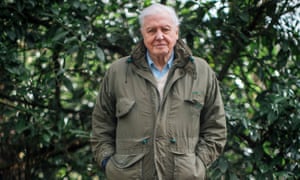e
Climate Change: The Facts review – our greatest threat, laid bare
 Maybe the message will filter through … David Attenborough in Climate Change – The Facts. Photograph: Polly Alderton/BBC
Maybe the message will filter through … David Attenborough in Climate Change – The Facts. Photograph: Polly Alderton/BBCDavid Attenborough’s rousing, horrifying call to arms should do for climate change denial what Blue Planet did for plastic
nce, a night in with David Attenborough promised the TV equivalent of a warm blanket. It was a chance to watch spectacular creatures revelling in the beauty of their natural habitats, as the man with a voice as soothing as ice-cream described what we could see, from the violent to the serene.
Those days are gone. Attenborough’s recent move to Netflix, for Our Planet, was deceptive: a seemingly gorgeous nature documentary that doubled up as animal kingdom snuff movies in which the beauty of those natural habitats was revealed as a crumbling paradise, ruined by people and particularly by greed. One of the main points of praise for Our Planet, which was well received, suggested that Attenborough was no longer tiptoeing around the issue of climate change, the implication being that he had done so before.
You sense that Our Planet was unfortunately timed for the BBC. In Climate Change: The Facts, the gloves are now not so much off as thrown to the floor in a certain rage. It’s right there in the title, bold and stark. This hour-long documentary, part of the Our Planet Matters season, is wide-ranging yet concise, easy to understand, not blighted by the ego of, say, An Inconvenient Truth, and it is designed to do for climate change denial what 2017’s Blue Planet did for single-use plastic.
That’s not to say it should be Attenborough’s responsibility to get the wider public to pay attention, nor that it is down to the BBC. It isn’t. But Climate Change: The Facts is a rousing call to arms. It is an alarm clock set at a horrifying volume. The first 40 minutes are given over to what Attenborough calls, without hyperbole, “our greatest threat in thousands of years”. Expert after expert explains the consequences of rising CO2 levels, on the ice caps, on coastal regions, on weather and wildlife and society itself.
The most powerful moments are in footage shot not by expert crews who have spent years on location, but on shaky cameras, capturing the very moment at which the reality of our warming planet struck the person holding the phone. In Cairns, Australia, flying foxes are unable to survive the extreme temperatures; rescuers survey the terrible massacre, and we learn that while 350 were saved, 11,000 died. A man and his son talk through their escape from raging wildfires, over the film they took while attempting to drive through a cavern of blazing red trees. These are horror movies playing out in miniature. It is difficult to watch even five minutes of this and remain somehow neutral, or unconvinced.
Yet as I kept on, scribbling down an increasingly grim list of statistics, most of which I knew, vaguely, though compiled like this they finally sound as dreadful as they truly are – 20 of the warmest years on record happened in the last 22 years; Greenland’s ice sheet is melting five times faster than it was 25 years ago – I started to wonder about responsibility, and if and where it would be placed. This would be a toothless film, in the end, if it were hamstrung by political neutrality, and if its inevitable “it’s not too late” message rested solely on individuals and what relatively little tweaks we might make as consumers. What about corporations? What about governments?
Then, at that exact moment, having played the despair through to its crescendo, the experts served up unvarnished honesty. They lined up to lay out the facts, plain and simple.
Fossil fuel companies are the most profitable businesses man has ever known, and they engage in PR offensives, using the same consultants as tobacco companies, and the resulting uncertainty and denial, designed to safeguard profits, has narrowed our window for action.
It is unforgivable. I find it hard to believe that anyone, regardless of political affiliation, can watch footage of Trump calling climate change “a hoax ... a money-making industry” and not be left winded by such staggering ignorance or astonishing deceit, though it is, more likely, more bleakly, a catastrophic combination of the two. At least Nigel Lawson only appears here in archive footage, and his argument sounds limp, to put it kindly.
Climate Change: The Facts should not have to change minds, but perhaps it will change them anyway, or at least make this seem as pressing as it needs to be. With the Extinction Rebellion protests across London this week, disrupting day-to-day business, and this, on primetime BBC One, maybe the message will filter through. At the very least, it should incite indignation that more was not done, sooner, and then urgency and a decision to both change and push for change at a much higher level. Because there is, for a brief moment, just possibly, still time.

Geen opmerkingen:
Een reactie posten
Opmerking: Alleen leden van deze blog kunnen een reactie posten.